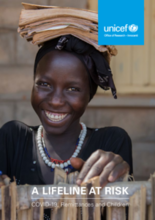Abstract
Millions of children around the world, particularly in low- and middle-income countries, live in households that receive money and other forms of support from a family member who has moved abroad, or to another part of the same country, to work. This form of assistance, or ‘remittances’, can alleviate household poverty and is often a key support for children’s development. In times of global economic uncertainty, however, remittances can be an unstable source of income for families. The COVID-19 pandemic is disproportionately affecting migrant workers’ job security, making it more difficult to send remittances. At the same time, families receiving remittances are facing their own economic and health challenges, meaning that the continuation of remittances is vital to keep them from slipping into poverty. This briefing paper outlines the potential risks of reduction in remittances due to the pandemic for children in households receiving remittances and what can be done to minimize these risks.

